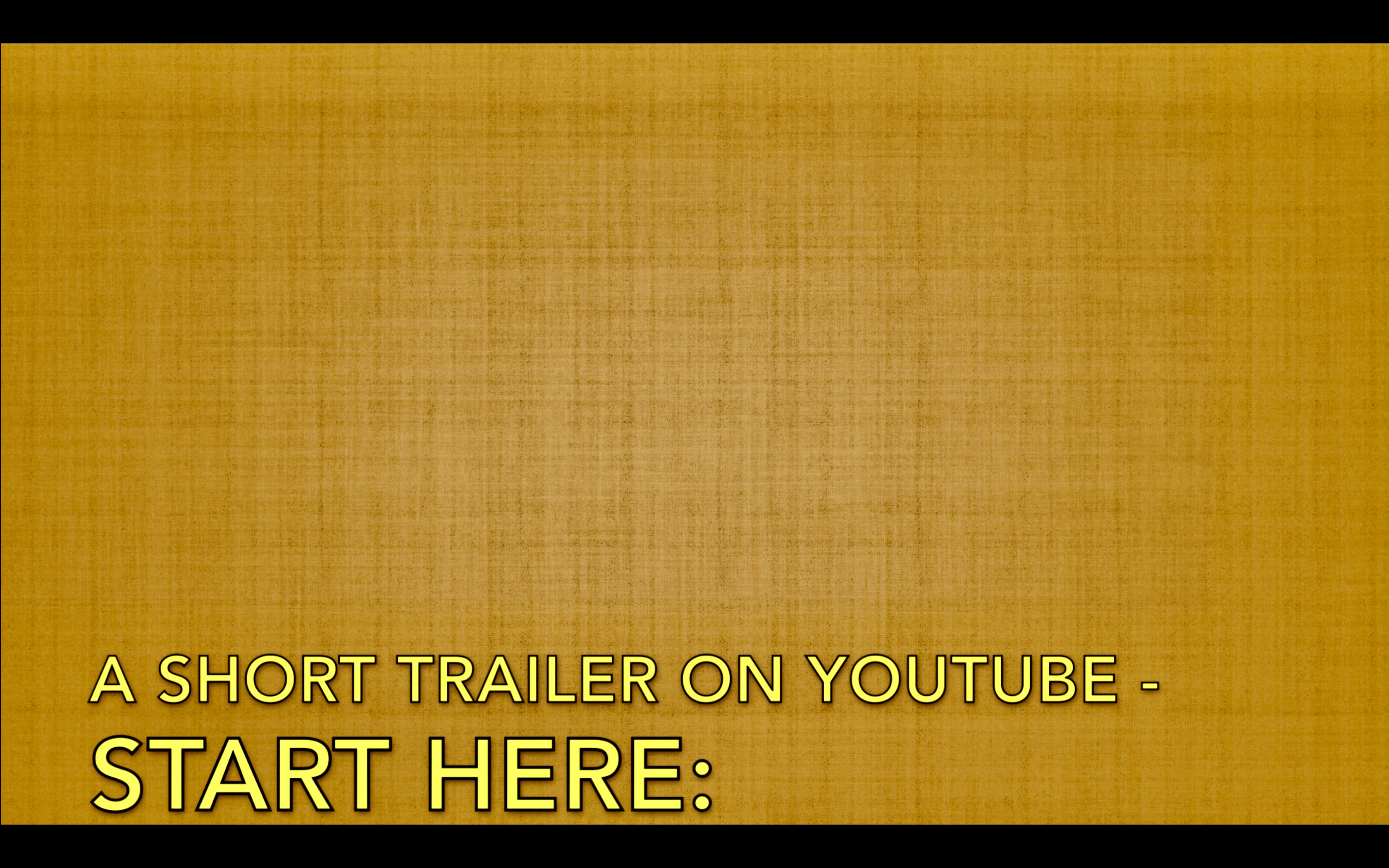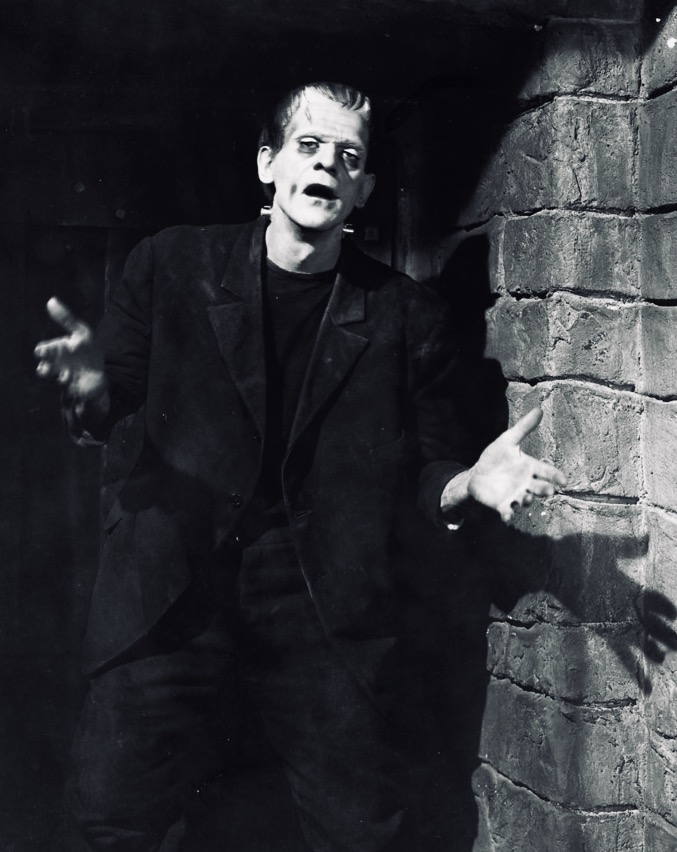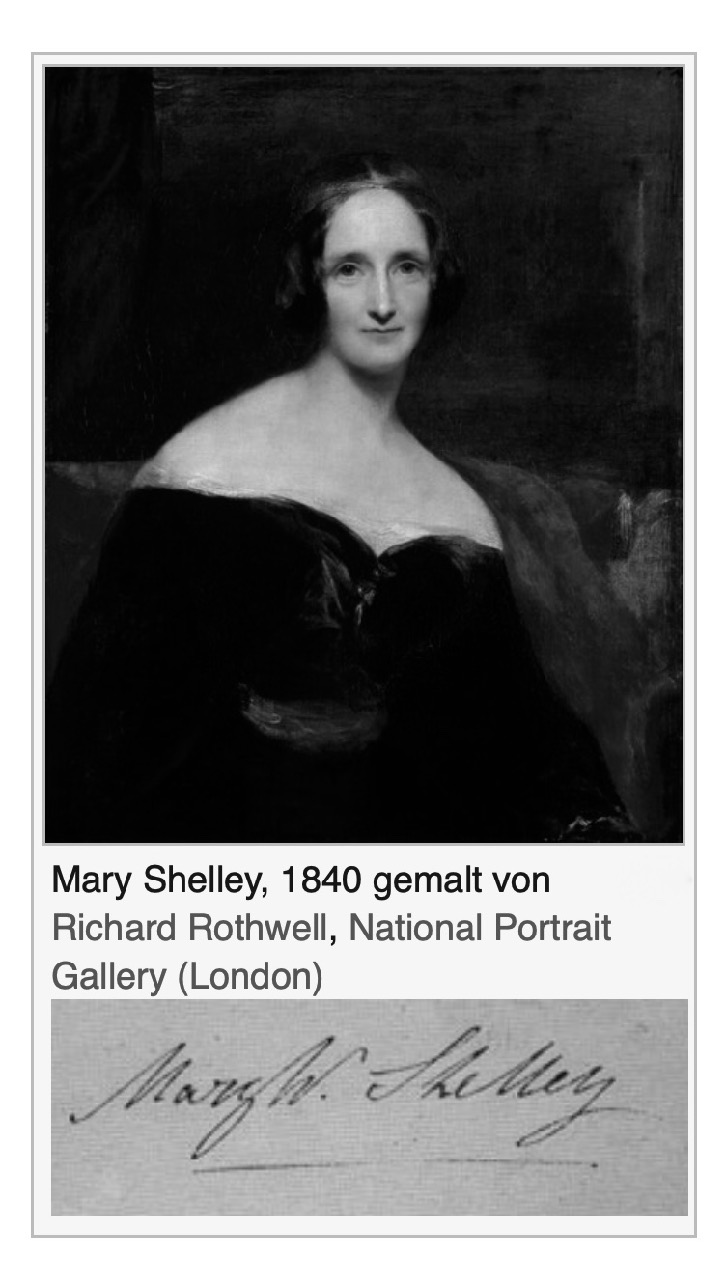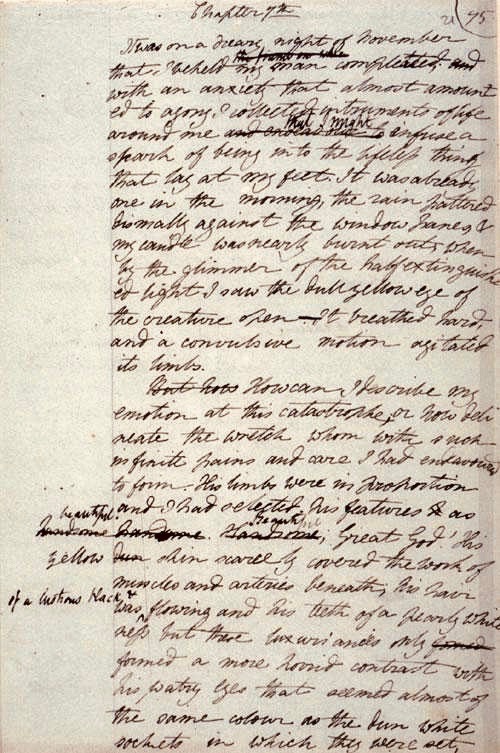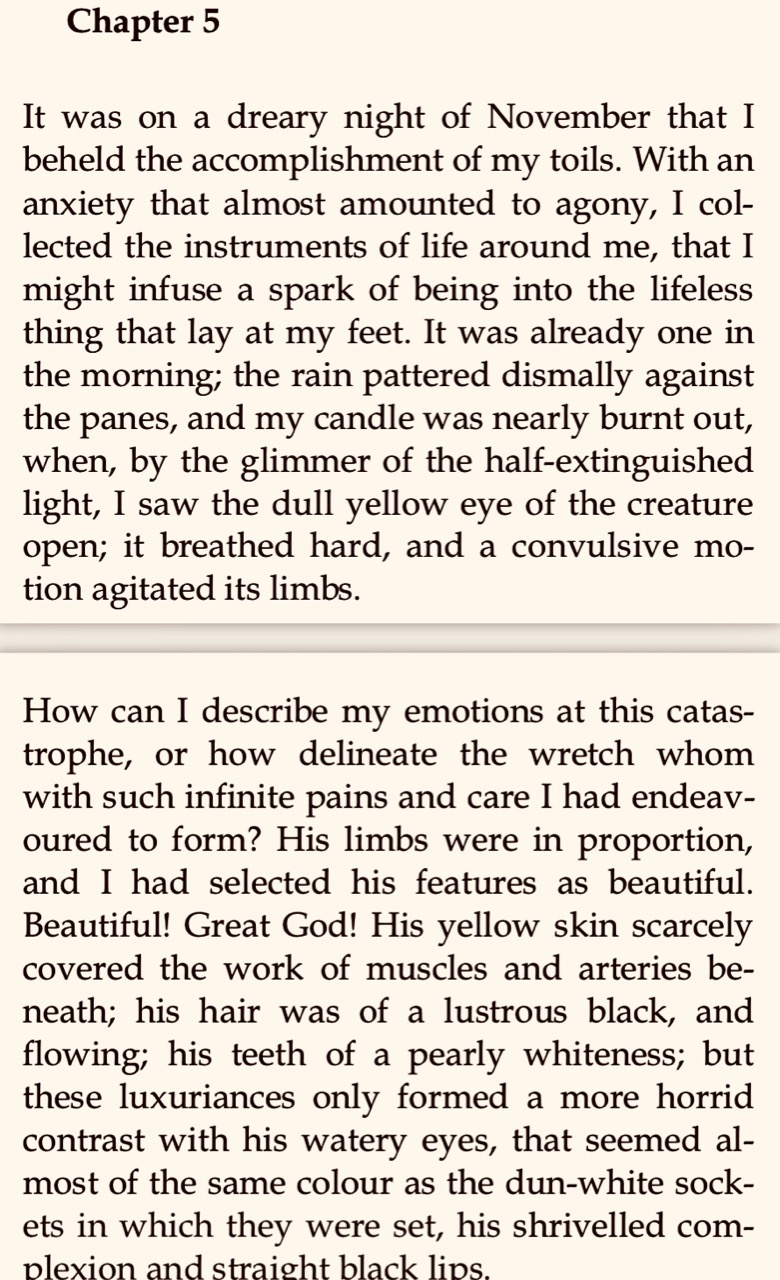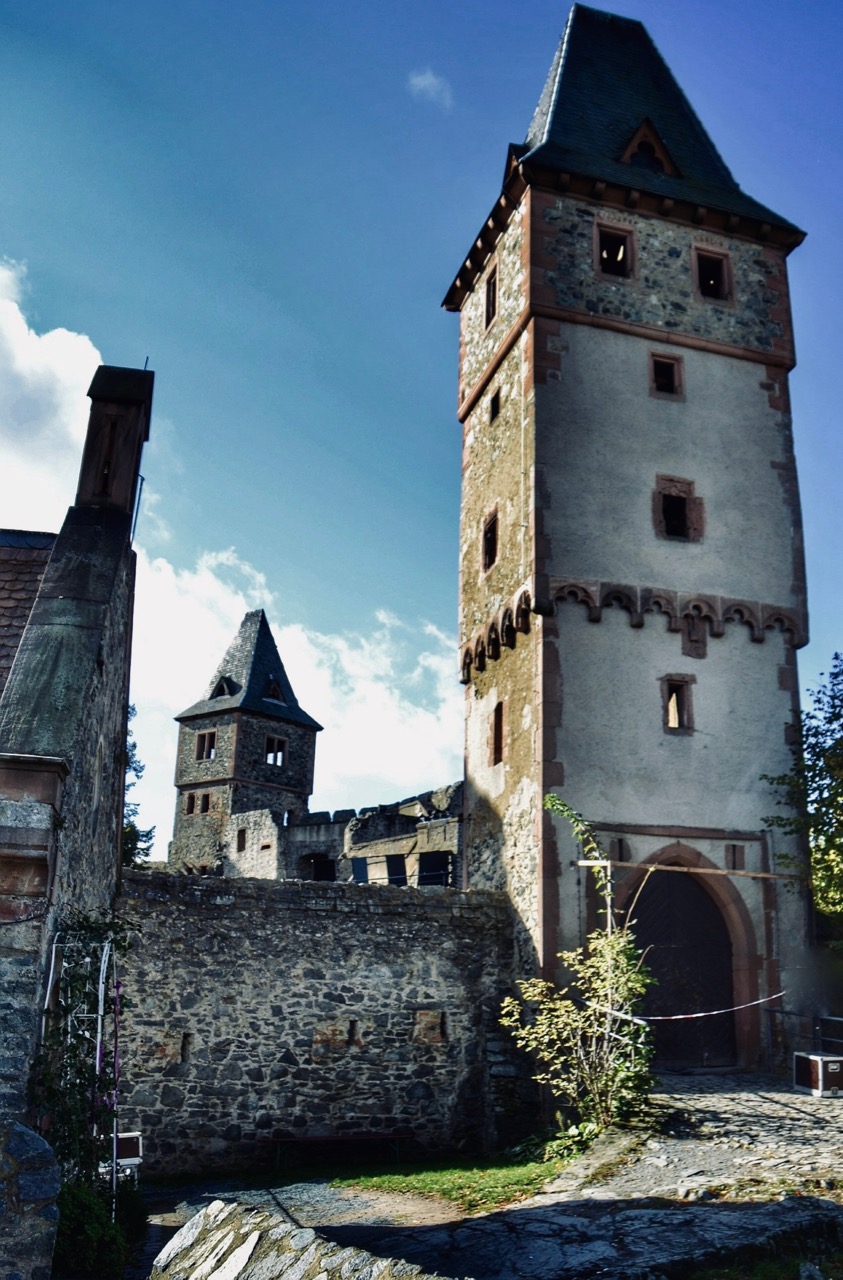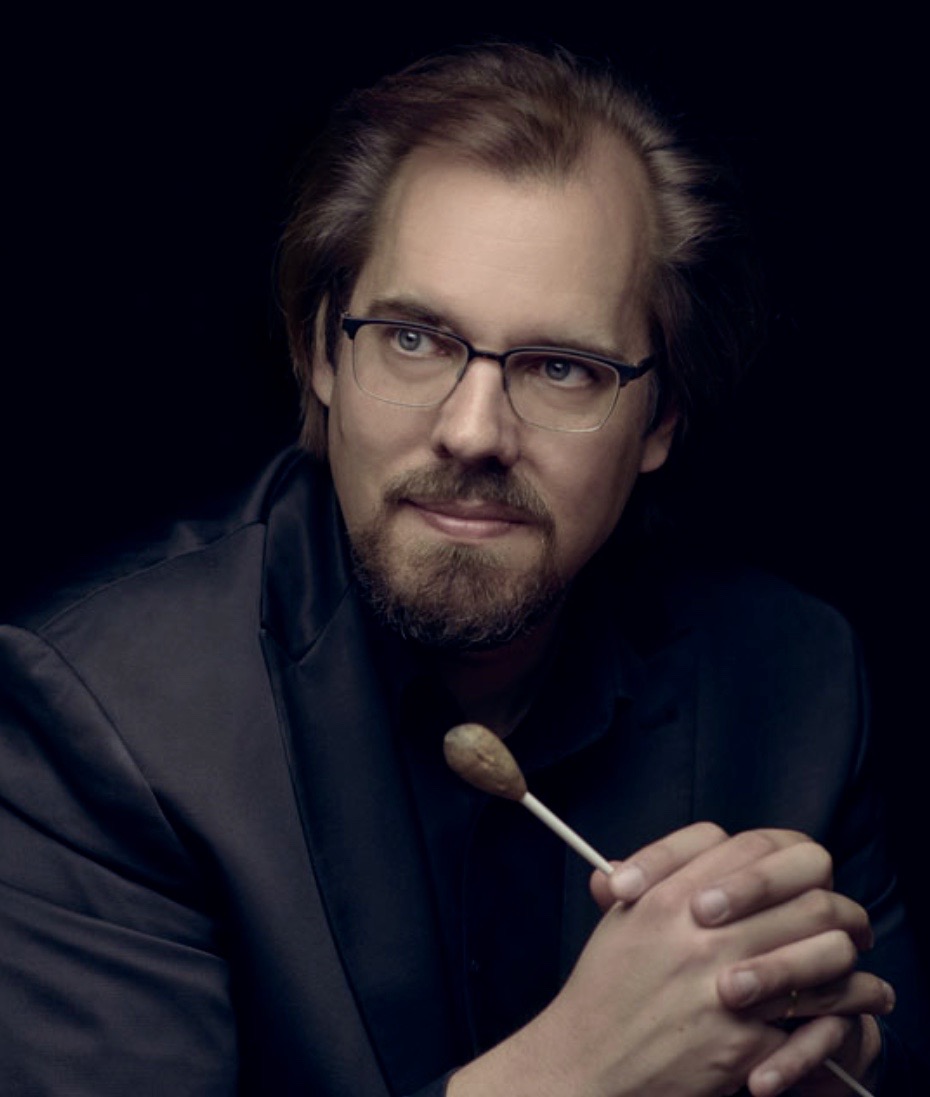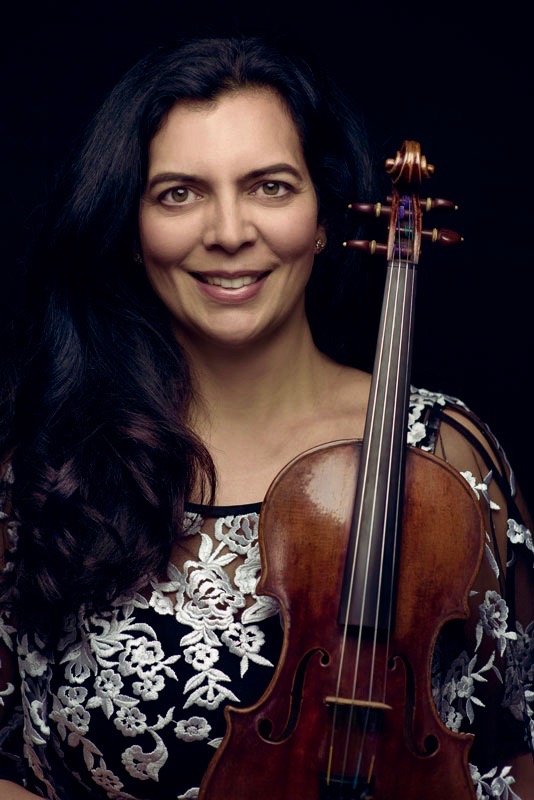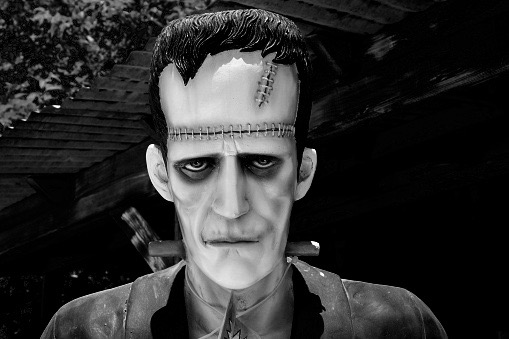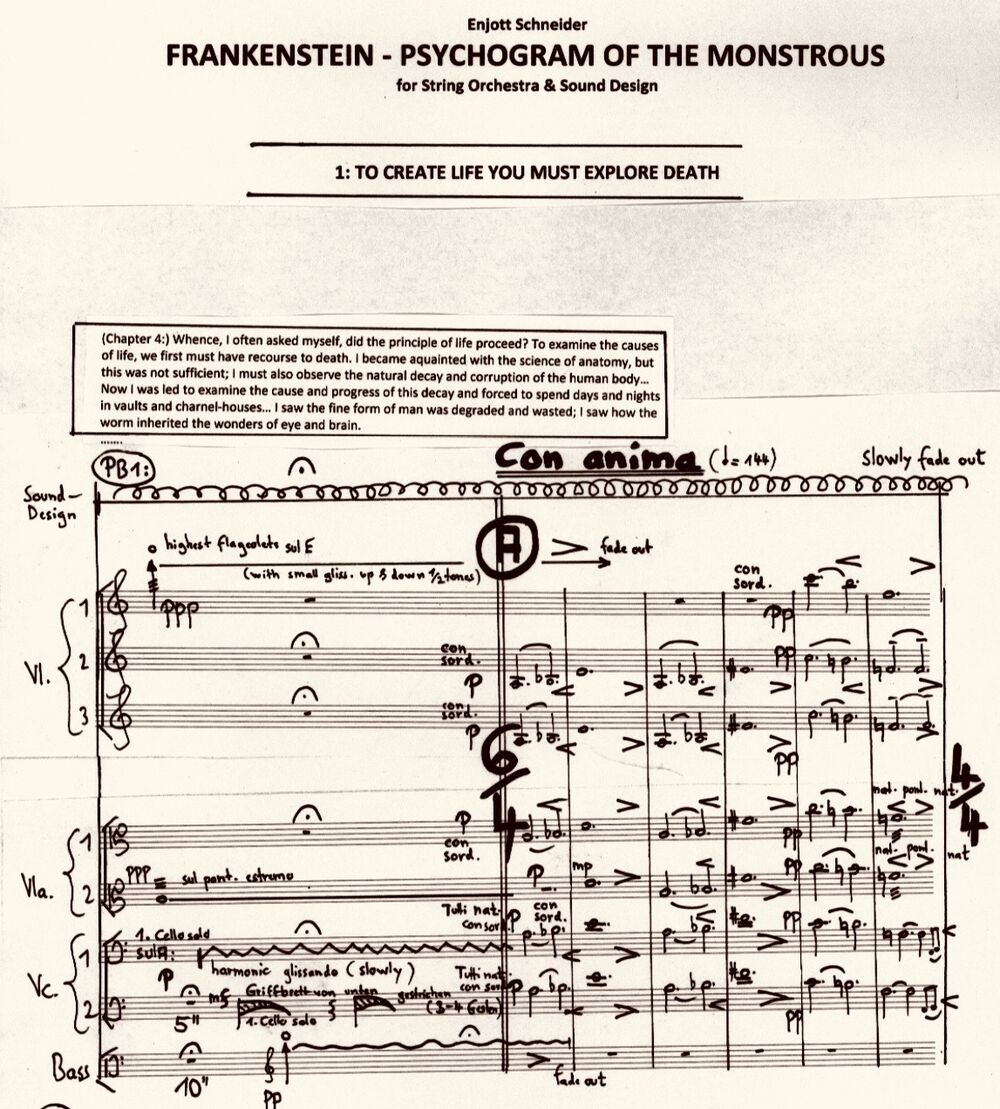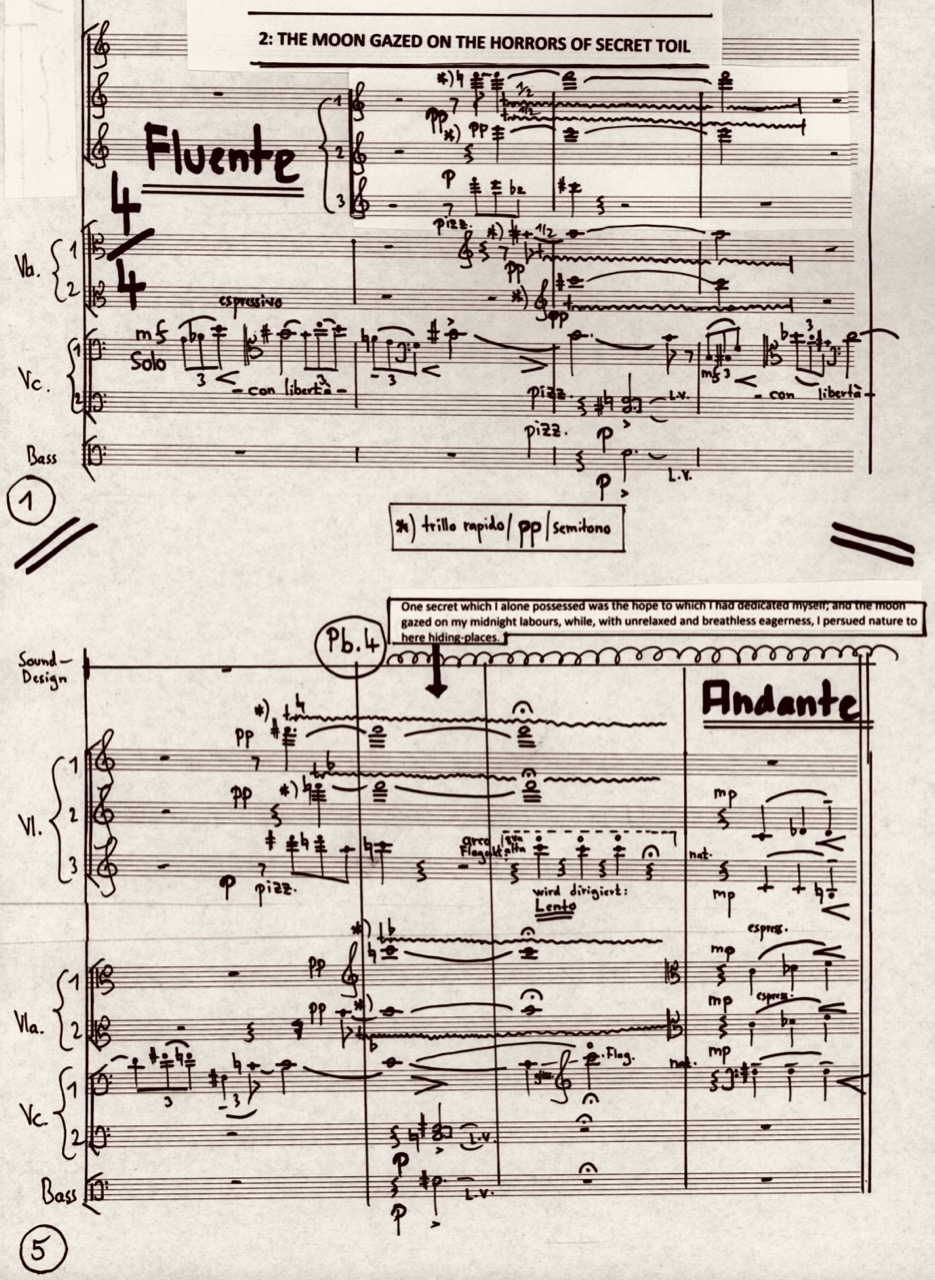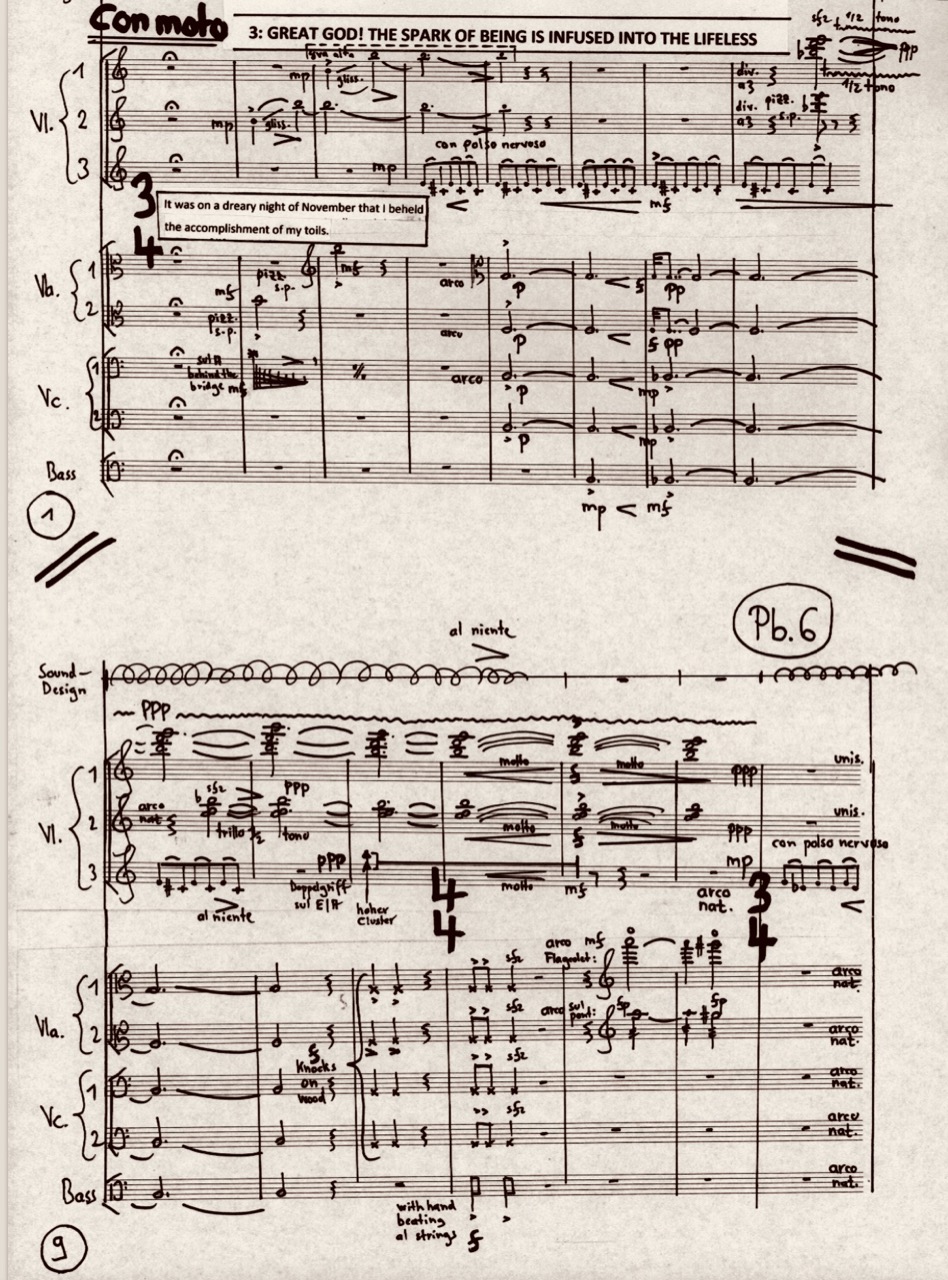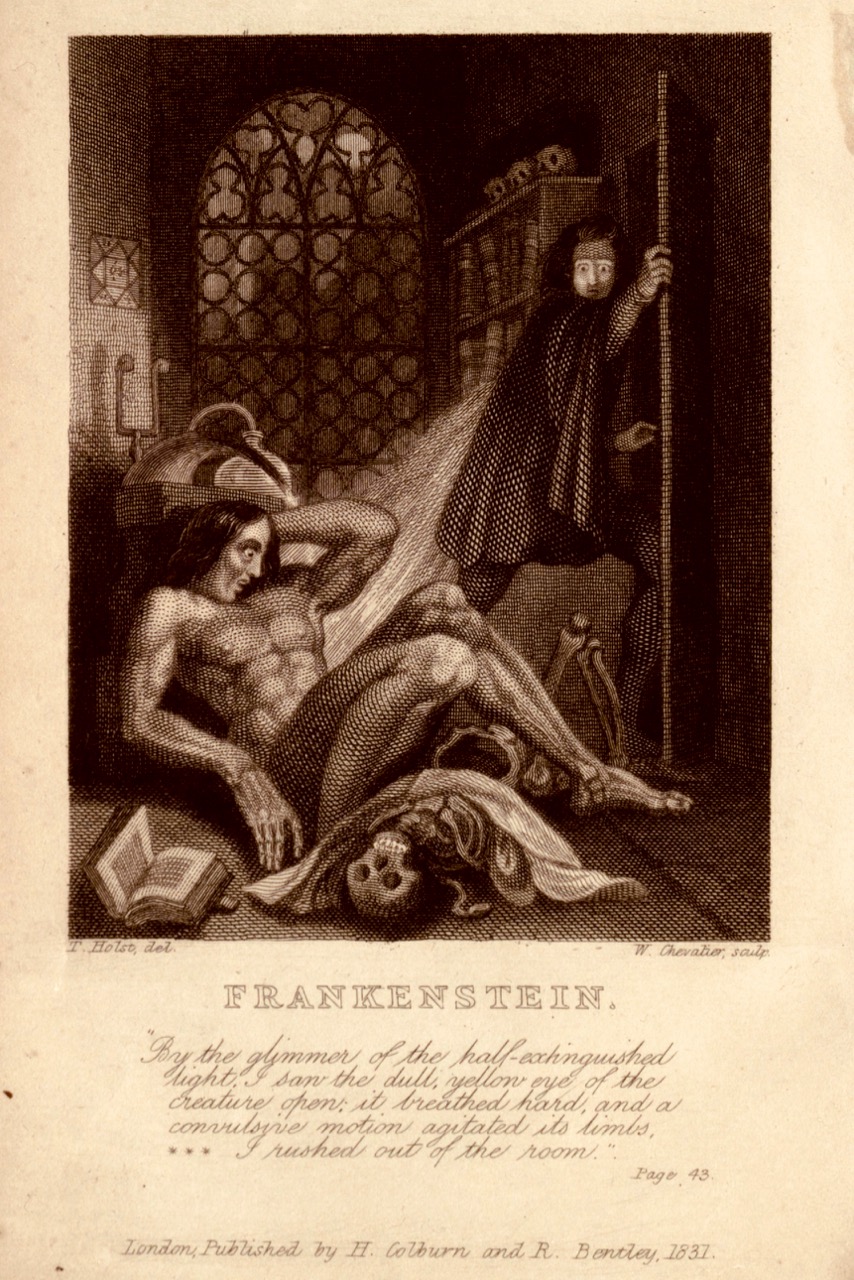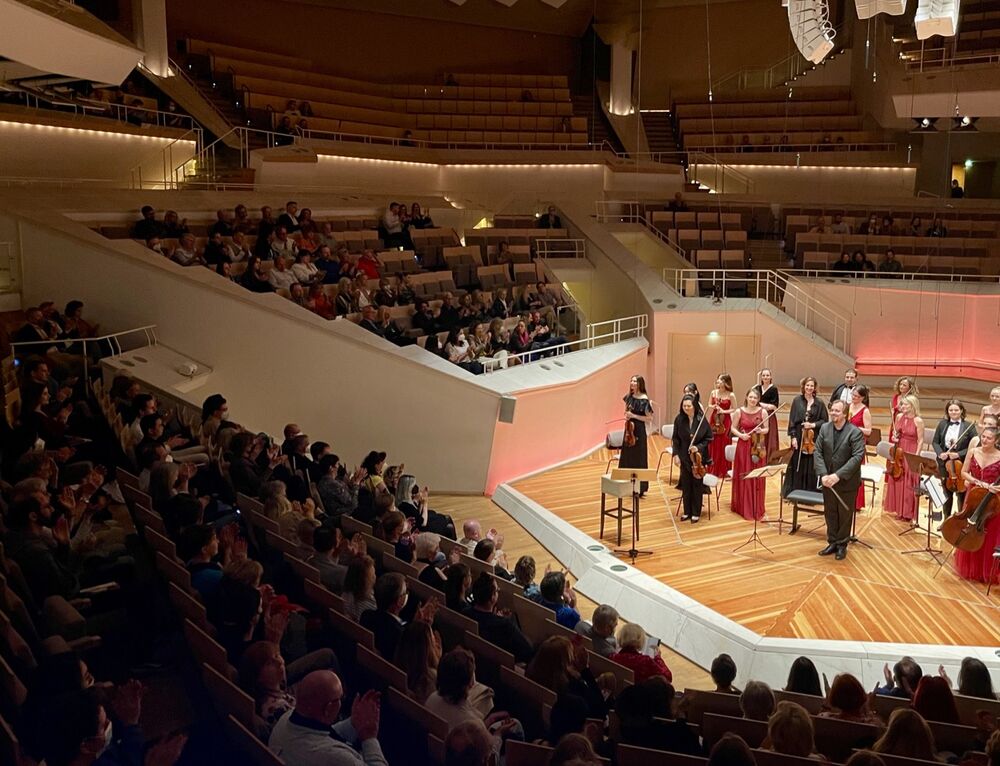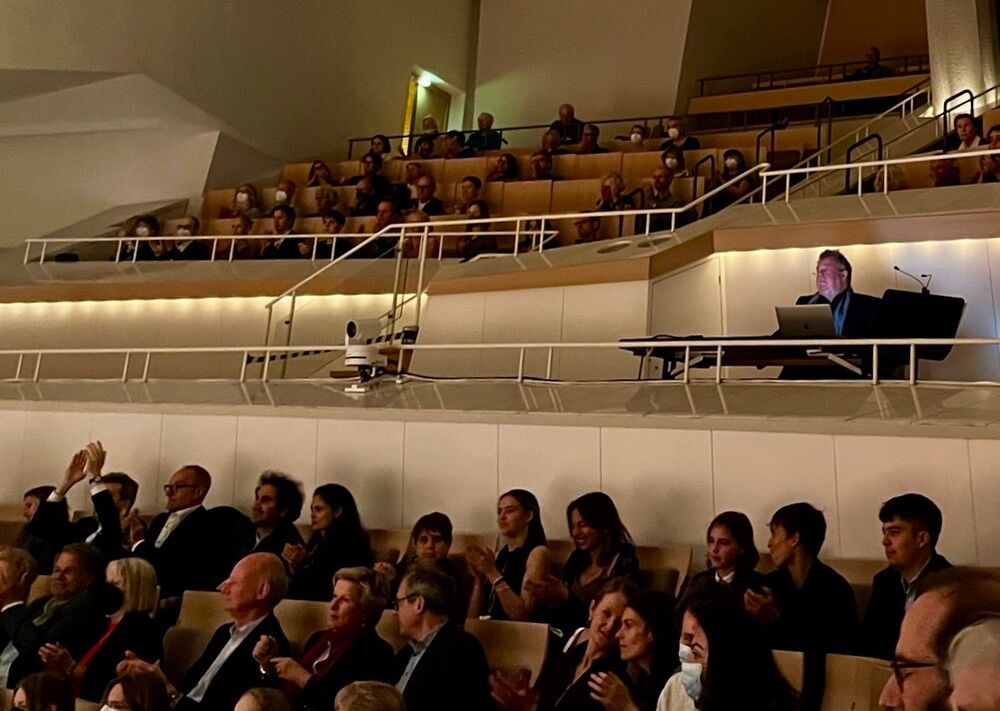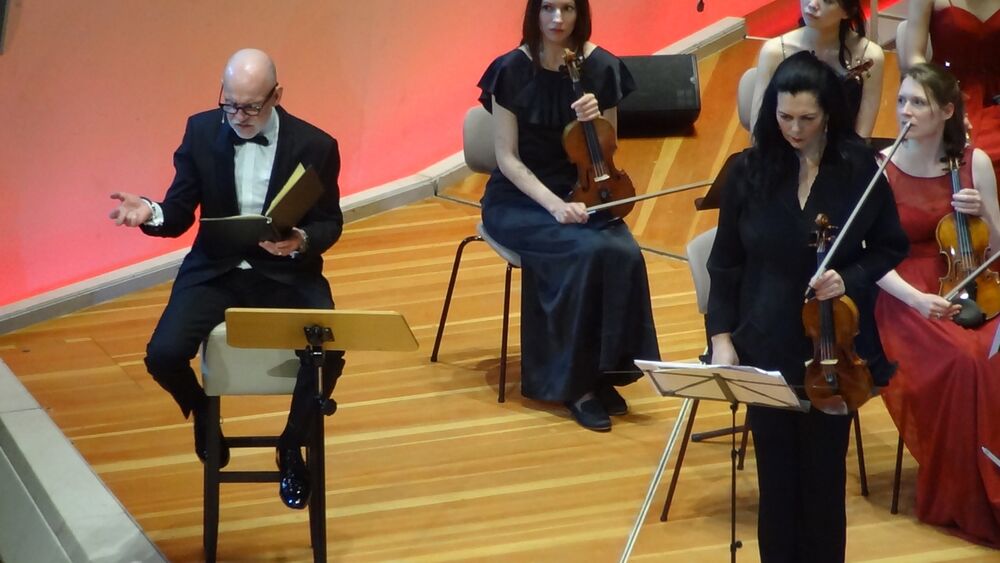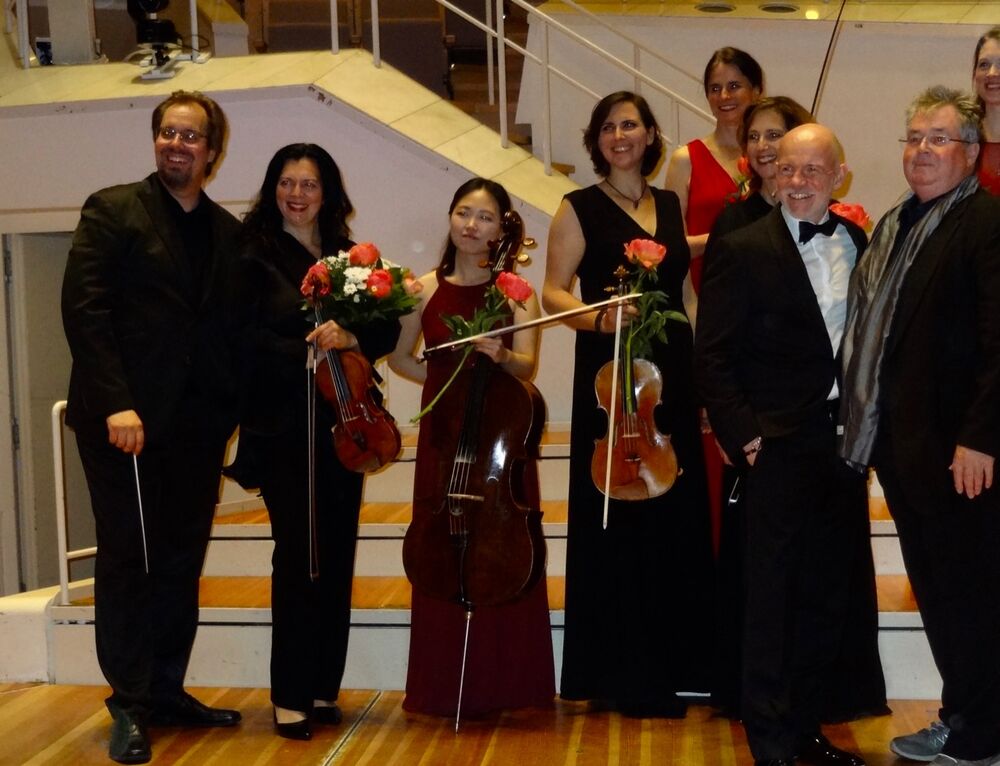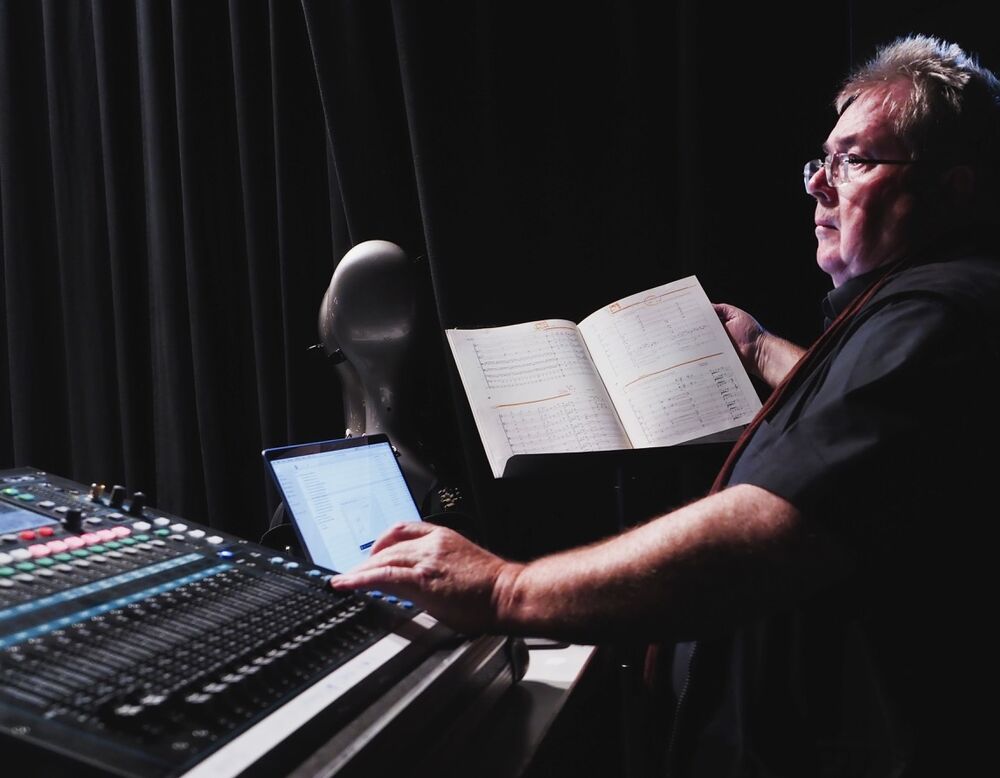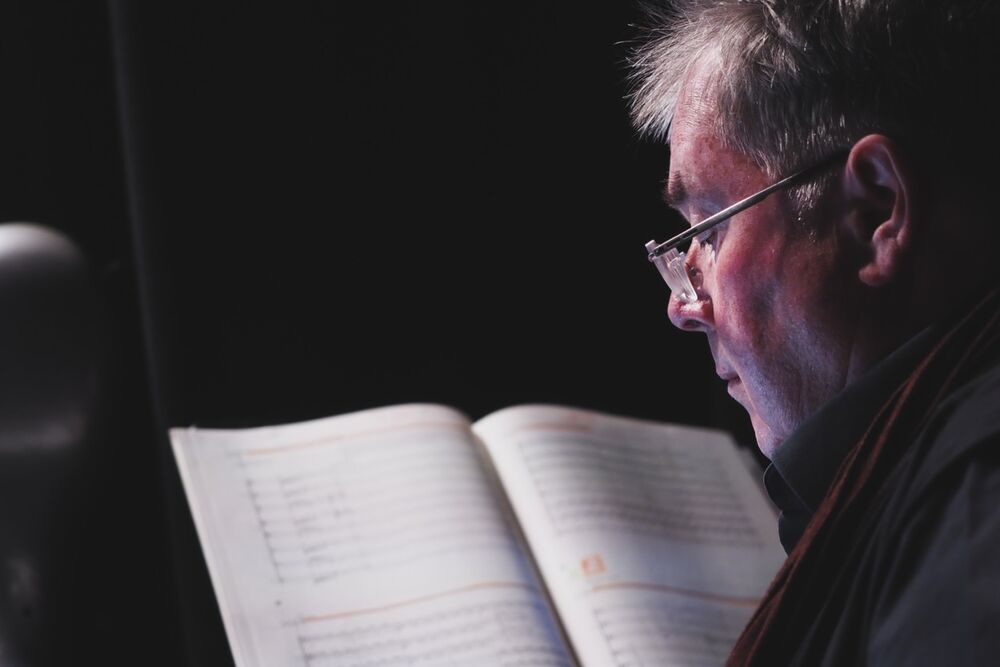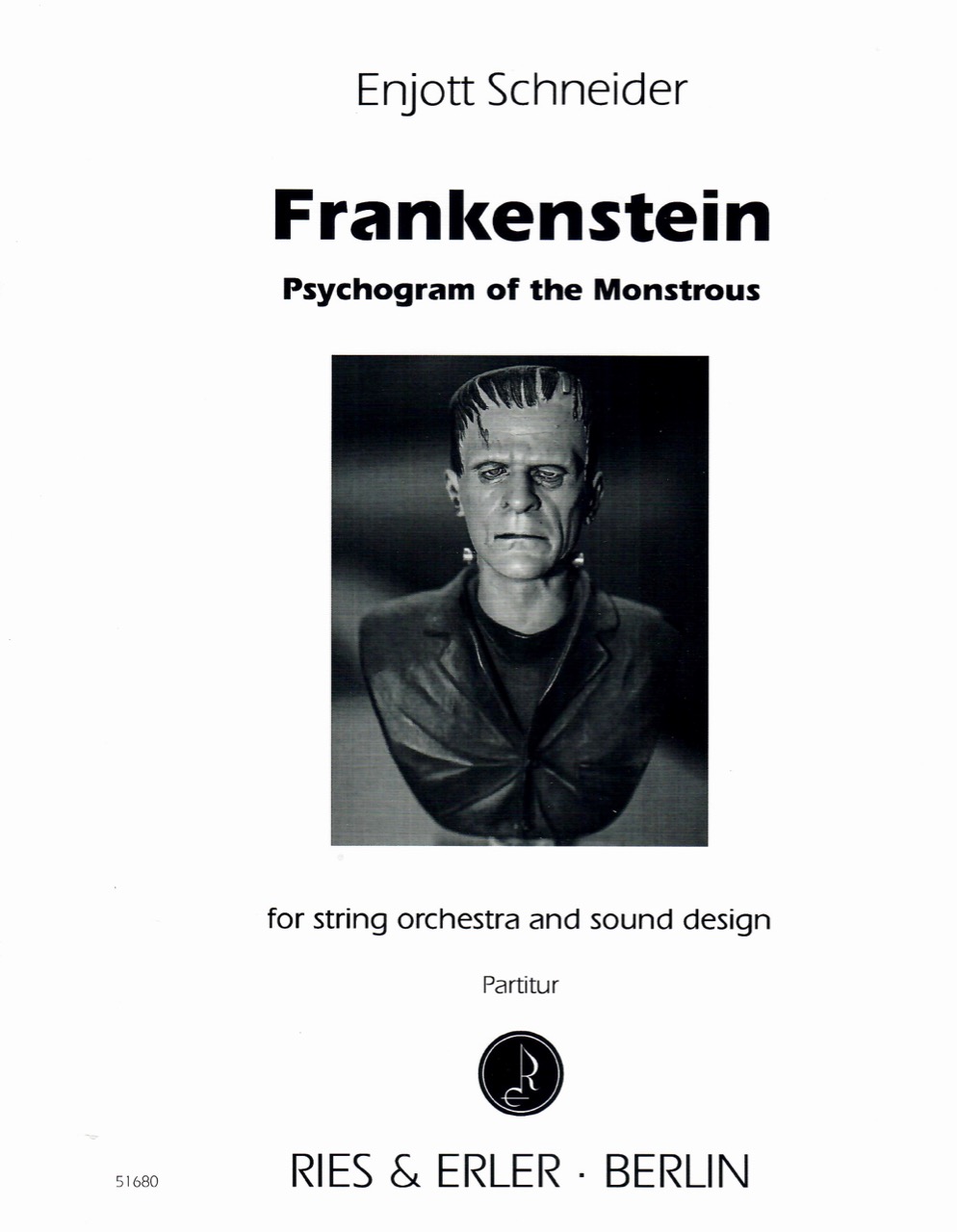
Category: Symphonic / Orchestral , Chamber Music , Opera / Music Theatre
FRANKENSTEIN - PSYCHOGRAM OF THE MONSTROUS
for String Orchestra & Sound Design, Inspired by text fragments from Mary Shelley: "Frankenstein"
(London 1818,Paris 1821), is a work that can be performed with a large string orchestra or chamber orchestra to atmospheric playbacks of electronics and sounds, but can also be expanded into a melodrama with an actor. It can be staged ad libitum as a ballet or music theatre.
The genesis of "FRANKENSTEIN is as exciting as the story itself. Mary Shelley wrote this novella at the age of 18. She travelled through Europe in 1815 and stayed in Gernsheim, close to Frankenstein Castle.
Movements: (attacca in one complete version):
1: TO CREATE LIFE YOU MUST EXPLORE DEATH
2: THE MOON GAZED ON THE HORRORS OF SECRET TOIL
3: GREAT GOD! THE SPARK OF BEING IS INFUSED INTO THE LIFELESS
4: DEATHLY AFRAID OF THIS WRETCHED CREATURE
Duration: 14 Minutes
Publisher of notes/sheet music: Musikverlag Ries & Erler (Berlin) , 2022
Instrumentation: ......
Violine 1/2/3
Viola 1/2
Violoncello 1/2
Kontrabass
Playbacks with Sounddesign
(Elektronics & noises, produced by Enjott Schneider,
Stereo-Audiofile with starting points indicated iun the score,
via Musikverlag Ries & Erler)
narrator (ad libitum) with text fragments from Mary Shelly’s
„Frankenstein“ (1818)
Text/Lyrics by: Mary Shelley (1797-1851), Texts ad libitum
Introduction: The genesis of the famous novel "FRANKENSTEIN, or: THE MODERN PROMETHEUS" is as unique and exciting as the story itself. Mary Shelley wrote this novella at the age of 18 and the first edition was published anonymously in London in 1818 because the subject was absolutely indecent for a lady. It was only in the second edition in Paris in 1821 that her name was mentioned. Maria Shelley travelled through Europe in 1815 and stayed in Gernsheim, near Frankenstein Castle, where centuries earlier an alchemist had been involved in strange experiments. She also visited Geneva, Switzerland, where the story of Victor Frankenstein - along with Ingolstadt - was then set.
Galvanism, alchemy and the occult world of thought were the topics of conversation, especially with her friend and then husband Percy B. Shelley. In 1816, Mary, Percy and Lord Byron competed to see who could write the best horror story. Afterwards, "Frankenstein" had an incredible influence on literature and popular culture in general as a "Gothic novel" - also due to the literarily complex frame story (also in letter form) via Captain Walton. Inspiration for Mary Shelley also came from the shared readings of German ghost stories by the fireside in Lord Byron's mansion.
These domestic settings were in turn conditioned by volatile and, above all, freezing weather emanating from the legendary volcanic eruption of Mount Tambora (Indonesia) in 1815, forcing the world into a long cold winter.... The fact that in this environment the exciting "Frankenstein" story of the young author Mary Shelley had occurred in a dream after midnight also proves the vehement power of the unconscious.
Dedication: Für Wolfgang Emanuel Schmidt
Additional remarks: Inspiriert von Textfragmenten aus Mary Shelley: „Frankenstein“
London 1818, Paris 1821, deutsch von Enjott Schneider) aus den Kapiteln 4 und 5 des Romans.
Satz 1:
Whence, I often asked myself, did the principle of life proceed? To examine the causes of life, we first must have recourse to death. I became aquainted with the science of anatomy, but this was not sufficient; I must also observe the natural decay and corruption of the human body… Now I was led to examine the cause and progress of this decay and forced to spend days and nights in vaults and charnel-houses… I saw the fine form of man was degraded and wasted; I saw how the worm inherited the wonders of eye and brain.
Oft habe ich mich gefragt: Woher kommt das Prinzip des Lebens? Um die Ursachen des Lebens zu erforschen, muss man sich zunächst mit dem Tod befassen. Ich machte mich mit der Wissenschaft der Anatomie vertraut, aber das reichte nicht aus; ich musste auch den natürlichen Verfall und die Korruption des menschlichen Körpers beobachten... Nun wurde ich dazu gebracht, die Ursache und den Fortschritt dieses Verfalls zu untersuchen, und ich war gezwungen, Tage und Nächte in Gewölben und Leichenhallen zu verbringen... Ich sah, wie die feine Form des Menschen entwürdigt und verwüstet wurde; ich sah, wie der Wurm sich in das Wunder von Auge und Gehirn hineinschlich.
…….
I paused, examining and analysing all the minutiae of causation, as exemplified in the change from life to death, and death to life, until from the midst of this darkness a sudden light broke in upon me – a light so brilliant and wondrous, yet so simple: I was surprised that among so many men of genius who had directed their inquiries towards the same science, that I alone should be reserved to discover so astonishing a secret.
Ich hielt inne, untersuchte und analysierte alle Einzelheiten der Kausalität, wie sie im Wechsel von Leben zu Tod und Tod zu Leben zum Ausdruck kommen, bis inmitten dieser Dunkelheit ein plötzliches Licht über mich hereinbrach - ein Licht, das so brillant und wundersam und doch so einfach war: Ich war überrascht, dass unter so vielen genialen Männern, die ihre Forschungen auf dieselbe Wissenschaft gerichtet hatten, nur mir die Entdeckung eines so erstaunlichen Geheimnisses vorbehalten sein sollte.
………
Satz 2:
One secret which I alone possessed was the hope to which I had dedicated myself; and the moon gazed on my midnight labours, while, with unrelaxed and breathless eagerness, I persued nature to here hiding-places. Who shall conceive the horrors of my secret toil as I dappled among the unhallowed damps of the grave or tortured the living animal to animate the lifeless clay… I collected bones from charnel-houses and disturbed, with profane fingers, the tremendous secrets of the human frame.
Ein Geheimnis, das nur ich besaß, war die Hoffnung, der ich mich verschrieben hatte, und der Mond schaute auf meine mitternächtliche Arbeit, während ich mit unvermindertem und atemlosem Eifer der Natur ihre Verstecke entriss. Wer kann sich die Schrecken meiner geheimen Arbeit vorstellen, als ich mich in den unheiligen Dämpfen des Grabes tummelte oder das lebende Tier quälte, um dann leblosen Lehm beseelen zu können ... Ich sammelte Knochen aus den Leichenhallen und störte mit profanen Fingern die ungeheuren Geheimnisse des menschlichen Körpers.
Satz 3:
It was on a dreary night of November that I beheld the accomplishment of my toils. With an anxiety that almost amounted to agony, I collected the instruments of life around me, that I might infuse a spark of being into the lifeless thing that lay at my feet. I saw the dull yellow eye of the creature open; it breathed hard, and a convulsive motion agitated his limbs. How can I describe my emotions at this catastrophe, or how to delineate the wretch whom which such infinite pains and acre I had endeavoured to form?... Beautiful! Great God! His yellow skin scarely covered the work of muscles and arteries beneath; his hair was a lustrous black, and flowing; his teeth of a pearly whiteness; but these luxuriances only formed a more horrid contrast with his watery eyes, that seemed almost of the same colour as the dun-white sockets in which they were set, his shrivelled complexion and straight black lips.
(Kapitel 5:) Es war in einer trüben Novembernacht, als ich zur Vollendung meiner Mühen kam. Mit einer Besorgnis, die fast einer Qual gleichkam, sammelte ich die Instrumente des Lebens um mich herum, um dem leblosen Ding, das zu meinen Füßen lag, einen Funken des Seins einzuflößen. Ich sah, wie sich das trübe gelbe Auge der Kreatur öffnete; sie atmete schwer, und eine krampfhafte Bewegung bewegte ihre Glieder. Wie kann ich meine Gefühle angesichts dieser Katastrophe beschreiben, wie kann ich den Unglücklichen schildern, den ich mit unendlicher Mühe und Sorgfalt zu formen versucht hatte? Wunderbar! Großer Gott! Seine gelbe Haut bedeckte furchterregend das Werk der Muskeln und Arterien darunter; sein Haar war glänzend schwarz und wallend, seine Zähne von perlendem Weiß; aber diese Üppigkeit bildete nur einen noch schrecklicheren Kontrast zu seinen wässrigen Augen, die fast dieselbe Farbe zu haben schienen wie die graubraunen Höhlen, in denen sie steckten, zu seinem verschrumpelten Teint und den geraden schwarzen Lippen.
…….
Every limb became convulsed, when, by the dim and yellow light of the moon, I beheld the wretch – the miserable monster whom I had created. He held up the curtain of the bed; and his eyes, if eyes they may be called, were fixed on me. His jaws opened, and he muttered some inarticulate sounds, while a grin wrinkled his cheeks… I escaped and rushed downstairs.
Alle Glieder verkrampften sich, als ich im schwachen, gelben Licht des Mondes den Unglücklichen erblickte - das elende Ungeheuer, das ich geschaffen hatte. Er hielt den Vorhang des Bettes hoch, und seine Augen, wenn man sie Augen nennen kann, waren auf mich gerichtet. Seine Kiefer öffneten sich, und er murmelte einige unartikulierte Laute, während ein Grinsen seine Wangen runzelte... Ich floh und stürzte die Treppe hinunter.
Satz 4:
I remained walking up and down in the greatest agitation, listening, catching and fearing each sound as if it were to announce the approach of the demonical corpse to which I had so miserably given life. Oh! No mortal could support the horror of that countenance. A mummy again endued with animation could not be so hideous as that wretch. I had gazed on him while unfinished; but when those muscles and joints were rendered capable of motion, it became a thing such as even Dante could not have conceived.
Ich ging in größter Aufregung auf und ab, lauschte, vernahm und fürchtete jedes Geräusch, als ob es das Anschleichen der dämonischen Leiche ankündigen würde, der ich so elendig das Leben geschenkt hatte. Oh! Kein Sterblicher könnte das Grauen dieses Antlitzes ertragen. Eine Mumie, die wieder zum Leben erweckt wurde, konnte nicht so abscheulich sein wie dieser Unglückliche. Ich betrachtete ihn, als er noch unvollendet war; aber als die Muskeln und Gelenke beweglich wurden, wurde er zu etwas, das sich nicht einmal Dante hätte vorstellen können.
World premiere: 27.05.2022, Philharmonie Berlin
Performers at world premiere: In the concert MAGIC OF CRIME of the Kammerphilharmonie METAMORPHOSEN Berlin, conductor: Wolfgang Emanuel Schmidt. Narrator: Dietmar Wunder, the german voice of Daniel Craig alias "James Bond". Second performance 12 of June 2022 in Elbphilharmonie Hamburg.
Records: 2022
